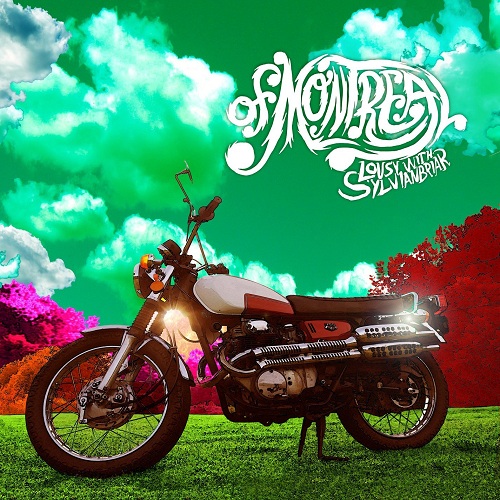
here is the NFO file from Indietorrents
01 Fugitive Air
02 Obsidian Currents
03 Belle Glade Missionaries
04 Sirens of Your Toxic Spirit
05 Colossus
06 Triumph of Disintegration
07 Amphibian Days
08 She Ain’t Speakin’ Now
09 Hegira migr
10 Raindrop in My Skull
11 Imbecile Rages
Encoder: iTunes v11.0.5
Sample Rate: 44.1 kHz
Codec: itunes
Avg Bit Rate: 320 kbps
Album info
pitchfork says:
Credit Kevin Barnes for knowing when he’s testing your patience. After last year’s Paralytic Stalks, where his flamboyance came across as ho-hum and even his self-absorption sounded strangely obligatory, Barnes changed up his process for Of Montreal’s 12th album. He left Athens, Georgia, and decamped to San Francisco to write. Instead of recording by himself, as he has done on almost every Of Montreal album, he assembled a small band of sympathetic performers. Together, they eschewed computers and lofty conceptualizing, favoring in-the-moment energy over down-the-rabbit-hole perfectionism. Relative to his usual dictatorial working method, it was positively democratic.
Especially after Stalks, Lousy is bracing. It’s arguably the best—not to mention the funniest, prickliest, most purple, and least fastidious—Of Montreal album since Hissing Fauna, Are You the Destroyer? Barnes sounds more focused and straightforward, perhaps newly aware that his listeners won’t follow him just anywhere. The songs here boast clearly defined choruses and verses and bridges, even if his digressions within melodies lend the music an intriguing volatility. If he was channeling Prince and Faust and the fictional glam-funk avatar Georgie Fruit on previous records, on Lousy with Sylvianbriar his spirit guides seem to be Donovan and Dylan. The album’s softer moments tweak the former’s pastoral folk and spiritually declarative lyrics, and when this iteration of the group cuts loose, they sound like they’re racing down Highway 61 en route to Plato’s Retreat. On “Belle Glade Missionaries” Barnes adopts Dylan’s long-winded phrasing, rushed delivery, and heavily coded lyricism, but the performance never descends into impersonation.
Dylan has been an evergreen influence on generations of musicians, but Barnes seems intent on puncturing the Bob mythos a bit, which means Lousy is never lousy with hero worship. Is that album cover a cheeky allusion to Bob’s infamous motorcycle accident, after which he retreated from public scrutiny for a few years? “Hegira Émigré” could be a sly parody of Dylanophilia, suggesting how ill-suited the old forms of protest music are to the post-Occupy world: “My baby’s meditating to stop the war, but I’ve got myself a rifle ’cause I ain’t gonna get walked on anymore,” Barnes sings, as the band stomps around like the Band ca. ’66.
Barnes’ songwriting has always thrived on petty feuds and lacerated relationships, stoking low-level, long-simmering interpersonal conflicts for inspiration. At his best, he teases out the tensile connections between humans, giving voice to the darker thoughts and casual prejudices that cloud every mind. Witness “Colossus” : “Your mother hung herself in the National Theater, when she was four months pregnant with your sister,” Barnes sings, setting the scene for someone else’s grim family drama. “Maybe your family, they are just losers.” The statement reads as harsh, but its poignant and commiserative, somehow, heightened by the band’s curiously delicate arrangement. It’s the most empathy Barnes has mustered in ages, even if the sentiment is barbed.
Barnes writes in in his own language, a peculiar and personal mix of purple prose poetry, exhausting academic-speak, prescription-medication warnings, and plainspoken pronouncement. So perhaps Dylan is an even more apt model for Barnes than Prince ever was. Like Dylan, he asks you to decode, to dissect, to discuss. Also like Dylan, Barnes seems playfully aware that his lyrics are Gordian knots, impossible for even the most devoted Of Montreal fan (including, possibly, himself) to untangle completely. And yet there are moments of clarity on Lousy with Sylvianbriar that prove Barnes is both his own harshest judge and most lenient jury. Or, as he sings on “Triumph of Disintegration”: “I had to make myself a monster just to feel something ugly enough to be true.”
